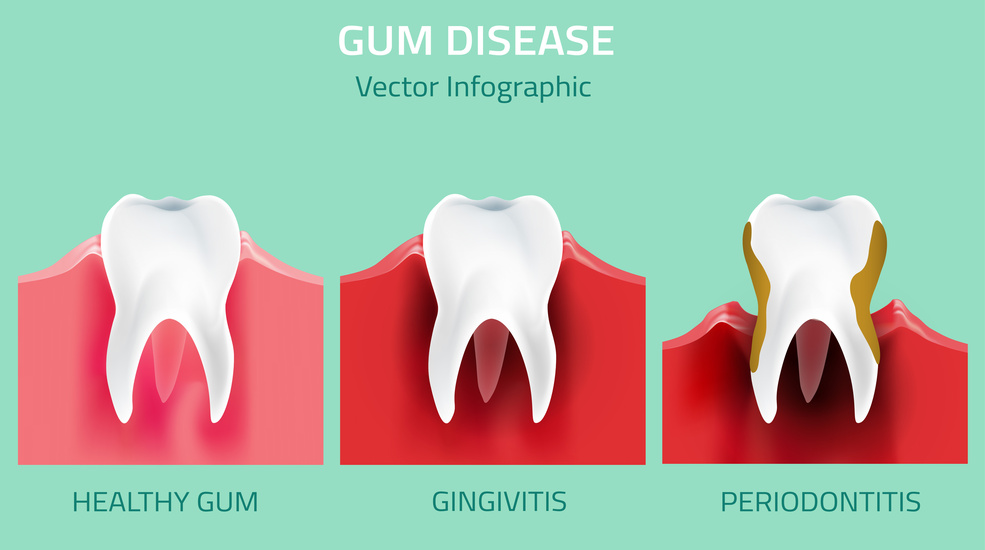Periodontal disease is a recurrent, infectious gum disease that leads to tooth loss and reduces quality of life (QoL). Furthermore, it is a persistent infection of the gums caused by germs that build up on your teeth and gums. Periodontitis progresses and causes bone and tooth destruction. However, if you seek early periodontal treatment in NE Calgary and practice good dental care, you can halt the damage caused by periodontitis.
In this article, we will crack open everything about periodontal treatment, from its different phases, causes, and complications to treatments. Read with us.
Different Phases of Periodontitis
Periodontitis starts with inflammation and progresses over time. The following are various preliminary phases of periodontitis:
Stage One: Gingivitis
Periodontitis begins with gum inflammation, also known as gingivitis. During the early stages of gingivitis, brushing or flossing might cause bleeding in your gums.
Teeth discoloration is also a sign of gingivitis, owing to the accumulation of plaque, food deposits, and germs on your teeth. It means that you rarely brush and floss or have your teeth cleaned.
Stage Two: Early Periodontal Condition
Early periodontal disease causes your gums to peel away from your teeth, forming microscopic pockets between your teeth and gums. The bags are a breeding ground for deadly bacteria, and your gums begin to shrink as your immune system fights the infection. Brushing and flossing will make your gums bleed, which will cause some bone loss.
Stage Three: Moderate Periodontal Condition
Dentists who do not treat gingivitis and early periodontal disease advance to moderate periodontal disease. You have bleeding, pain, and gum recession around your teeth. Your teeth start losing bone support and eventually become loose. In addition, the virus triggers inflammatory responses throughout your body.
Stage Four: Advanced Periodontal Condition
When you have advanced periodontal disease, the connective tissue that holds your teeth together begins degenerating. Your gums, bones, and other supporting tissue are destroyed. Progressive periodontal disease causes significant discomfort when chewing, coupled with halitosis and a displeasing mouth environment. Tooth loss is also an option.
Causes of Gum Periodontitis
Everyone has millions of germs in their mouths, the vast majority of which are completely safe. However, bacteria proliferate and collect on the teeth if you do not properly clean them every day.
Another reason bacteria develop in the mouth is a failure to visit your dentist in NE Calgary for regular cleanings. Periodontitis is primarily caused by poor tooth hygiene. When you fail to brush your teeth and clean the hard-to-reach parts of your mouth, you put yourself at risk for the following:
- Plaque is formed when bacteria in your mouth proliferate and form a material called plaque.
- When plaque is not removed by brushing, germs deposit toxins within the plaque over time.
- Within 48 hours, plaque hardens into tartar, encouraging bacterial growth toward the tooth’s base.
- Your body’s immune system reacts to bacterial development, causing inflammation in your gums.
Periodontitis Complications
If you do not have periodontal therapy, the components that support your teeth, including your jaw, are vulnerable to destruction. Your teeth become loose, leading them to fall out or require removal, among other difficulties.
Treatment for Periodontitis
During periodontal treatment near you, the deposits of bacteria and plaque stacked on teeth and gums are removed. Your dental care staff will instruct you on how to keep your teeth and gums clean to reduce bacteria in your mouth.
Dentists advise on proper brushing and flossing practices and additional oral care items such as water picks or mouthwash. Professional cleanings will most likely be performed to peel off plaque and tartar piles from your teeth and roots.
Periodontal pockets in your mouth necessitate a thorough cleaning that includes scaling and root planing. Dentists sometimes use antibiotics to help with obstinate gum infections that do not respond to cleanings. You must see your dentist near you every few weeks at first, then every three to six months to check your progress.
If the periodontal pockets persist, dentists may propose surgical therapy. Periodontitis can be stopped if diagnosed and treated early. If you want to succeed with the treatment, you must adjust your oral hygiene practices and follow your dentist’s instructions completely.
Book a Session With Our Dentist
Temple Square Dental has and will always work in the direction of educating and assisting patients in the best manner possible regarding their dental problems. If you are stuck somewhere with your dental difficulties, get in touch with us right away!

